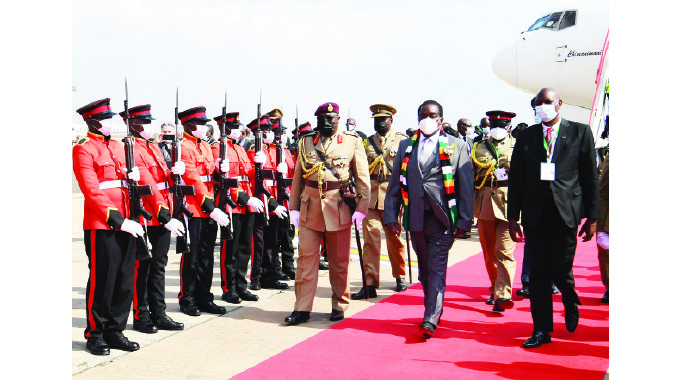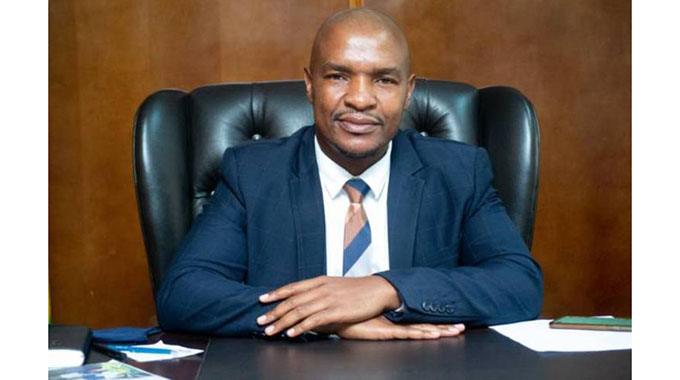Sadc maps growth path

Darlington Musarurwa in LILONGWE, Malawi
President Mnangagwa joins his regional counterparts here today for the 41st Ordinary Summit of SADC Heads of State and Government, expected to take stock of progress in deepening regional integration and promoting industrialisation.
He arrived here yesterday and was met at Kamuzu International Airport by Malawian Minister of Agriculture Mr Lobin Lowe, Zimbabwe’s Ambassador to Malawi Dr Nancy Saungweme and Foreign Affairs and International Trade Minister Ambassador Frederick Shava, who travelled ahead of the delegation.
Due to Covid-19, a limited number of delegates will attend this year’s indaba which is running under the theme, “Bolstering productive capacities in the face of Covid-19 pandemic for inclusive, sustainable, economic and industrial transformation”.
The regional body has opted for a hybrid format that combines face-to-face meetings and virtual engagements.
SADC is championing a regional industrialisation strategy premised on industrialisation, competitiveness and regional integration as enunciated in the region’s 10-year economic blueprint, the Regional Indicative Strategic Development (RISDP) (2020-2030, which feeds off Vision 2050.
“The summit will take stock of progress made in promoting and deepening regional integration in line with SADC’s aspirations as espoused in the RISDP (Regional Indicative Strategic Development Plan) 2020–2030 and Vision 2050, which envisage a peaceful, inclusive, competitive, middle- to high-income industrialised region where all citizens enjoy sustainable economic well-being, justice and freedom,” said SADC in a recent statement.
The bloc’s main objective is to “achieve economic development, peace and security, growth, alleviate poverty, enhance the standard and quality of life of the peoples of Southern Africa, and support the socially disadvantaged”.
The industrialisation strategy seeks to transform the region through industrialisation, skills development, modernisation, science and technology, financial strengthening and deeper regional integration.
Member states, however, have their work cut out as current data indicates that the region is still lagging behind in terms of achieving the set targets.
There has been slow progress in ratifying the protocol on Industry, which was agreed on at the 39th SADC Summit in Tanzania in 2019, including delays in operationalising the Regional Development Fund (RDF) to support mineral beneficiation and other industrial projects in the region that require large-scale investments.
Regional leaders will also assess the security situation in the region, particularly in Mozambique, where countries have made an undertaking to deploy troops to deal with the insurgency that has so far killed 2 500 people and displaced more than 800 000 in Cabo Delgado province.
On 23 June, the 16-member regional bloc, acting on recommendations from a technical team that had been deployed in neighbouring country, agreed to deploy its Standby Force under the framework of the SADC Mutual Defence.
The technical team recommended sending 3000 troops with land, air and naval capabilities.
On August 9, the SADC Mission in Mozambique (SAMIM) formally joined the campaign.
It includes troops from South Africa (1 495), Botswana (300), Lesotho (125) and Angola (20).
Zimbabwe is contributing 304 specialist military instructors.
However, all the envisaged regional initiatives will have to be spearheaded by a new Executive Secretary who will be elected during the ongoing Summit.
Dr Stergomena Lawrence Tax, who was incidentally first sworn into office in Malawi in August 2013, has served her full term.
Member States will have to choose between DRC’s Professor Faustin Luanga Mukela, who is a senior official at the World Trade Organisation (WTO), and Mr Elias Magosi, the current head of the Botswana Public Service.
There has been intense jockeying for the post.
A special envoy from DRC President Felix Tshisekedi, Mr Didier Mazenga Makanzu (DRC’s Regional Integration Minister), met President Mnangagwa at State House in Harare on July 21 to canvass support.
“The tradition is that when both posts are vacant (the Executive Secretary and Deputy Executive Secretary posts) the deputy’s post automatically goes to the host country, which is Botswana, but Botswana also wants to have the top post, so the DRC came to seek Zimbabwe’s support because our country is the only one that can present a candidate for the top post,” he said after the meeting.
Zimbabwe indicated it would make a decision after consultations.
The Summit ends tomorrow.









Comments